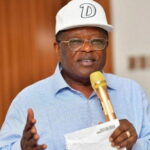
By Henry Ojelu, Omeiza Ajayi, John Alechenu & Musa Ubandawaki, LAGOS
President-elect, Asíwájú Bola Tinubu, yesterday condemned what he described as “isolated” cases of infractions, ethnic slurs and violence that trailed the 2023 General Elections, declaring that elections were now over for the healing process to begin.
But the presidential candidate of the Peoples Democratic Party, PDP, Alhaji Atiku Abubakar, in a swift reaction, dismissed Tinubu’s call for healing after a violent election as the height of hypocrisy.
These came as The Washington Post commended the general elections, stating that despite some obvious flaws in the process, the democratic system had held and was holding — far better, so far, than might have been expected.
This is even as the Sultan of Sokoto, Alhaji Mohammed Sa’ad Abubakar III, and President-General, Nigeria Supreme Council for Islamic Affairs, NSCIA, asked those not happy about the outcome of the just-concluded general elections to seek redress in court and avoid the violent protest.
In what appeared a post-mortem of the polls, Tinubu said the polls, which were held across 28 states and the state legislative poll across the 36 states of the federation had brought the 2023 election cycle to a fitting close.
While he praised President Muhammadu Buhari, the Independent National Electoral Commission INEC, and other stakeholders, Tinubu said consolidating democratic governance at the sub-national level will bring more development and improved quality of life to the masses.
‘Let’s rise above foibles of sentiments’
Condemning the violence and other negative trends that followed the conduct of the elections, the President-elect appealed to Nigerians to rise above the foibles of partisanship, ethnicity and religious sentiments and focus more on the “valued strings that bind us together as a people.”
He said; “I am saddened by the reported isolated infractions during the elections and its aftermath in some states. I strongly condemn it. Also, the report of arson after the announcement of governorship results in one state that did not represent who we truly are: peace-loving people.
“The physical and verbal assaults committed are unacceptable and antithetical to democratic ethos.
“Elections should be a celebration of our maturing democracy and freedom of choice and ought not to be moments of grief. I am particularly pained by cases of ethnic slurs, which are capable of creating needless mischaracterisation reported in some locations.
“My appeal is for us to rise above our differences, which, in reality, are fewer than the valued strings that bind us together as a people, irrespective of the circumstances of our births.
“As former governor of Lagos State, I can attest to the strength in our diversity and togetherness. As your President-elect, it is that spirit of inclusiveness we engendered in Lagos that I intend to bring into national governance so that together we can attain our full potential.
“I will give priority to expanding the civic space and safeguarding citizens’ freedom to exercise their rights within the bounds of the law.
“Indeed, the elections are over. The people have voted to elect their governors and state legislators that will serve them for the next four years. The time for leadership and governance is now upon us.
“In a democracy, the majority would have their way but that majority must not suppress the minority from having their say. As democrats, we have to safeguard free expression. Winners must be magnanimous and those who did not win should have a large heart for tolerance and respect for the greater interest of the nation.’’
He called on all elected officials to take urgent steps to unite the people and champion the healing process.
“We must take urgent steps to unite the people; those who voted for us and those who did not. We must champion the healing process by embracing the opponents and their supporters.
‘’As I have stated previously, the time for politicking is gone. This is time for nation-building, a task beyond one individual or a section of society. We need every hand from wherever it may come to be on deck,” said Tinubu.
Tinubu’s call for healing after unleashing violence, is hypocritical, says Atiku
Reacting to Tinubu’s call, the presidential candidate of the Peoples Democratic Party, PDP, Atiku Abubakar, dismissed it as the height of hypocrisy.
He, however, commended the United States government for condemning the violent and ethnically charged election in Lagos State.
Tinubu had, in a statement he personally signed yesterday, expressed sadness by what he described as “ infractions in some states as well as the divisive rhetoric that characterised the polls.”
In response, Atiku, who spoke through his Special Assistant on Public Communication, Mr Phrank Shaibu, in a statement, described Tinubu’s statement as an “after-thought and hypocritical garbage.”
He said it was curious that Tinubu was talking about reconciliation after his loyalists attacked Igbo voters in Lagos in order to give his party- the All Progressives Congress, APC, an advantage during the governorship election.
Shaibu said Tinubu had continued to protect transport hooligans, politicians and even traditional leaders in Lagos who were seen on video threatening non-indigenes.
Atiku said: “Tinubu’s latest statement is laced with hypocrisy and lies. For a whole month, traditional leaders, transport hooligans and politicians in his camp threatened non-indigenes but Tinubu kept mute.
“His lackey, MC Oluomo, who is a member of his presidential campaign council, was seen on video threatening Igbo people but Tinubu said nothing.
“His campaign spokesmen, Bayo Onanuga and Femi Fani-Kayode, went on social media to warn Igbo people against exercising their franchise but Tinubu looked the other way.
“Traditional rulers imposed curfews and went about slaughtering goats and placing them in front of polling units but Tinubu said nothing.
“A traditional leader and council chairman in Gbara community, Eti Osa local government summoned non-indigenes to a meeting where they threatened non-indigenes with eviction if they failed to vote for the APC but Tinubu said nothing.
“Those invited by the police ignored invitations because Tinubu is shielding them. On the day of election, many people who looked Igbo were beaten and prevented from voting but Tinubu kept mute.
“Now that his party has stolen the election, he has found his voice and is preaching reconciliation. He should tell that to the marines.
“If Tinubu is serious, he should ensure that all those found culpable are arrested and prosecuted. But we know he cannot do this because he is their godfather.”
He also described the statement by the US Embassy in Nigeria condemning the violence meted out to the Igbo as a welcome development.
He, however, said the US ought to have gone further by mentioning the names of those found culpable and exposing the identities of those it will hit with visa restrictions.
Atiku added: “We commend the US and the EU governments for condemning the violence and intimidation that marred the governorship election, especially in Lagos, where Tinubu’s henchmen held the state to ransom.
“But the US knows the identities of the perpetrators of violence and ought to have mentioned their names. MC Oluomo is an American citizen.
“The US must also go further by mentioning the names of others, including the traditional rulers in Lagos who were complicit.
“The US has in the past openly condemned Vladmir Putin of Russia and others found wanting in other countries.
“This is not the time for political correctness. Those who will be slammed with visa bans should be named and shamed.”
Atiku maintained that there could be no reconciliation without restitution, adding that anything short of this would not heal any wounds.
He further argued that Tinubu had shown from his electioneering that he had no plan to unite Nigeria but was only after one thing – power and the resources of Nigeria.
“Tinubu is only after power. Before he took over power, Lagos was known for its urbane and accommodating nature. The late Nnamdi Azikiwe built his political base and business empire in Lagos.
“Mbonu Ojike, born in Imo State, was the Deputy Mayor of Lagos in 1951. Many others from around the country and beyond built businesses and political careers in Lagos unmolested.
“But on Bola Tinubu’s watch, Lagos has become an intolerant state where non-indigenes are openly beaten on election day and threatened with eviction if they don’t vote for his party. Now he seeks reconciliation? What a joke!
“There will be no reconciliation until MC Oluomo and all his minions who took part in issuing threats and brutalising people are diligently prosecuted.”
Nigeria points way towards democracy in region – Washington Post
In a related development, The Washington Post has commended the February 25, Presidential and National Assembly election and the March 18 governorship and Houses of Assembly polls, stating that despite some obvious flaws in the process, the democratic system has held and is holding — far better, so far, than might have been expected.
In its editorial dated Monday, Marched 20, 2023, the publication described the election as a ‘messy affair’ but added that much good came out of it.
It stated that leading opposing candidates’ decision to challenge the outcome of the election in the court, instead of resorting to violence and absence of military interference, were pointers that Nigeria’s electoral process could stand as a reference point for other African countries where post-election violence and coup had become a pattern.
The publication stated: “It might be tempting for opponents of democratic governance to take Nigeria as a case study in why democracy can’t work in Africa. Actually, the opposite is true.
‘’In Nigeria, even with its chaotic and flawed process, the system has held and is holding — far better, so far, than might have been expected. True, Nigeria’s presidential election on February 25 was a messy affair.
‘’Some polling places didn’t open on time. A new electronic voting system to upload results from the 176,000 scattered polling places to a central website seemed to collapse. There were reports of scattered violence in a few places, with ballot boxes stolen at gunpoint. Turnout was disappointing, at 28.6 per cent.
“The candidate of the current ruling party, Bola Tinubu, was declared the winner with 36 per cent of the vote on March 1. But because of the problems, the result is being challenged by his two closest rivals, Atiku Abubakar, who won 29 per cent and Peter Obi, who got 25 per cent.
‘’Mr. Abubakar, Mr. Obi and their supporters claim the election chaos means the voting was rigged in favor of the ruling party, but they have yet to produce concrete evidence of malfeasance. They are demanding the election be rerun. That doesn’t mean the vote should be discounted. In fact, much good came from it.
“It is encouraging, first, that the losing candidates are pursuing their claims through the courts. They have until March 31 to present their petitions to Nigeria’s appeal court tribunal, which would be expected to issue a written decision within 180 days.
‘’While the rhetoric has been heated, remarkably there have been no reports of post-election violence, intimidation or threats. No one has blocked highways, as happened in Brazil after Jair Bolsonaro lost his re-election bid. Opposition party supporters have not attempted an insurrection.
Nigeria’s military stayed out
“Second, Nigeria’s military has stayed out of the fray. This was not a given, since Nigeria’s generals ruled the country after a series of coups for most of the 1980s and ’90s. In Africa and elsewhere, a supposedly flawed election has been a handy excuse for militaries to annul election results and seize power for themselves.
‘’It happened in Myanmar in early 2021, for example, despite no evidence of any fraud. If Nigeria’s generals remain on the sidelines this time, it could be taken as evidence that Africa’s most populous country, and its largest economy, has moved past its coup-prone history.
“Third, this proved to be Nigeria’s most competitive election since democracy was restored in 1999. Each of the three top candidates — Mr Tinubu, Mr Abubakar and Mr Obi — won 12 of the country’s 36 states, a surprisingly even split. And Mr Obi, who was projected to win in some polls, could claim a stunning victory in Lagos state, Mr Tinubu’s home turf.
‘’Mr. Obi’s campaign was powered by young, better-educated urban voters savvy with social media, but he was unable to make inroads in more rural and traditional areas. But at 61, he is nearly a decade younger than Mr Tinubu, 70, and can be expected to be in politics for years to come.
“Nigeria’s neighbours and its major trading partners, including the United States, have all accepted the result, which most international observers said was largely free and fair, despite problems.
‘’But a delicate period lies ahead. If President-elect, Tinubu, is eventually confirmed as the winner, he will need Nigerians to fully accept that he was the legitimate victor. This means the losing candidates should have their day in court and be able to present any evidence that election-day problems affected the final result.
“Officials have asserted that technical glitches, not sabotage, were the issue and have cited poor internet connections and heavy traffic that slowed the system. But to restore trust, they need to demonstrate this with transparency.
‘’All election day irregularities need to be thoroughly examined. And the country’s Independent National Electoral Commission, INEC, needs to assess what went wrong and fix it.
“A round of elections on Saturday for 28 governorships and state assemblies seemed to be much better managed and passed without major snafus, despite some scattered reports of violence.
‘’Even a flawed election in Nigeria can set a standard in a part of Africa where staging a coup is more common than canvassing for votes. Among Nigeria’s neighbors, Chad’s military leader, Mahamat Idriss Déby, who seized power when his father was killed in 2021, has repeatedly delayed elections and halted a return to democracy.
“Military leaders in Mali, which saw coups in 2020 and 2021, have delayed elections until 2024. Guinea’s first democratic leader was toppled in 2021. Niger has been rocked by coup attempts.
‘’Benin’s President, Patrice Talon, has clung to power and stacked the parliament, which must approve presidential candidates, with his supporters. In Cameroon, President Paul Biya has ruled since 1982.
‘’An election in Nigeria won’t turn Africa into a democratic utopia. But it can point the way to a different path.”
Those aggrieved should go to court —Sultan
Meanwhile, the Sultan of Sokoto, Alhaji Mohammed Sa’ad Abubakar III, and President General, of Nigeria Supreme Council for Islamic Affairs, NSCIA, have asked those unhappy about the outcome of the just concluded general elections to go to court.
Recall that complaints have continued to trail the presidential/National Assembly and governorship/State Assembly elections, prompting calls from prominent Nigerians on those aggrieved about the outcome to seek redress, rather than adopting a violent approach.
The Sultan, who spoke at a Ramadan symposium with the theme: “Ramadan, the Month of Blessings”, organised in collaboration with the Jama’atul Nasril Islam, JNI, Nigeria Union of Journalists, NUJ, and the Islamic Education Trust, IET, yesterday, also urged Nigerians to embrace peace and ensure peaceful coexistence after the general elections.
He said: “We should embrace peace with our brothers and sisters, not allow politics to destroy our relationships. Any politician, who feels aggrieved should seek redress in court.
“Politics and elections are all over and the blessed month of Ramadan is approaching, we should then seek forgiveness from one another.
“This is in order to be among the ones Allah will bless with multiple rewards in the sacred month.’’
The sultan further advised Nigerians to eschew differences and shun violent tendencies as the elections were over and God had chosen leaders for the country.’’
The post Tinubu sues for peace, condemns ethnic slurs, election violence appeared first on Vanguard News.





